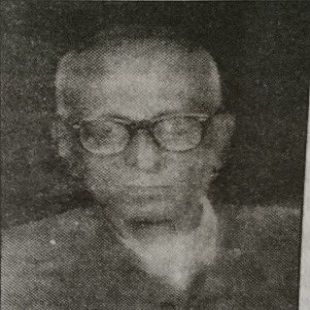
Atmakuru Govindacharyulu (1895-1973) was a resident of Agrahara Gopavaram village in Tadepalligudem taluka, near Ganapavaram Mandal in West Godavari district. He was born in 1895 to Venkata Krishnamacharya, a renowned journalist, an acclaimed writer, and poet; and his wife and Subhadra. Though he was born into a wealthy family he gave up his fortune and health on the altar of the homeland. He was preparing to travel to the United States of America to further his education when, responding to Gandhiji's clarion call, he plunged into the independence movement and the ethnic liberation movement. He organized a scout organization and established a number of libraries before establishing Gandhiji National College in Eluru, West Godavari district, in 1921. He was convicted of one year in prison on 30 October 1922 for organizing a non-tax campaign in the Bhimavaram taluka. Imprisoned at Rajahmundry Central Jail. He fought for Harijan upliftment since 1923. He divorced his wife after taking in a Harijan youngster named Joseph as an inmate of his house. He established a khadi production center in Eluru and led the prohibition campaign and the Simon Commission boycott effort. He edited and published Satyagraha, a Telugu weekly, but soon his press was confiscated. On 23 April 1930, he was sentenced to one year in prison for directing Salt Satyagraha volunteers. He was imprisoned in the Tiruchirappalli and Vellore prisons. On 17 October 1930, he was freed for medical reasons. During the Civil Disobedience campaign, he was condemned to 8 months in jail on 8 August 1932. Imprisoned at Rajahmundry and Vellore prisons and released on 3 January 1932 he again participated in the Individual Satyagraha movement and on 10 December 1940 was sentenced to 9 months in prison and a fine of Rs 200/-, or in default, further imprisonment of 3 months. He spent his jail term in the Vellore and Tiruchirapalli Jails. He spent a year in the Pallepadu Satyagraha Ashram in the Nellore area. Although bedridden, he campaigned for the success of the Quit India movement. For many years, he was a member of the APCC and the AICC. From 1940 to 1952, he was a member of the Madras Legislative Council's District Board. He was also a Fellow of the Royal Asiatic Society, London, 1941. He was a member of the Andhra University Senate. He wrote the biography of Mahatma Gandhi in 1921, and he has conferred the title ‘Kalaprapoorna’ by the Andhra University for his contributions to Telugu literature. He died on 9 December 1973.